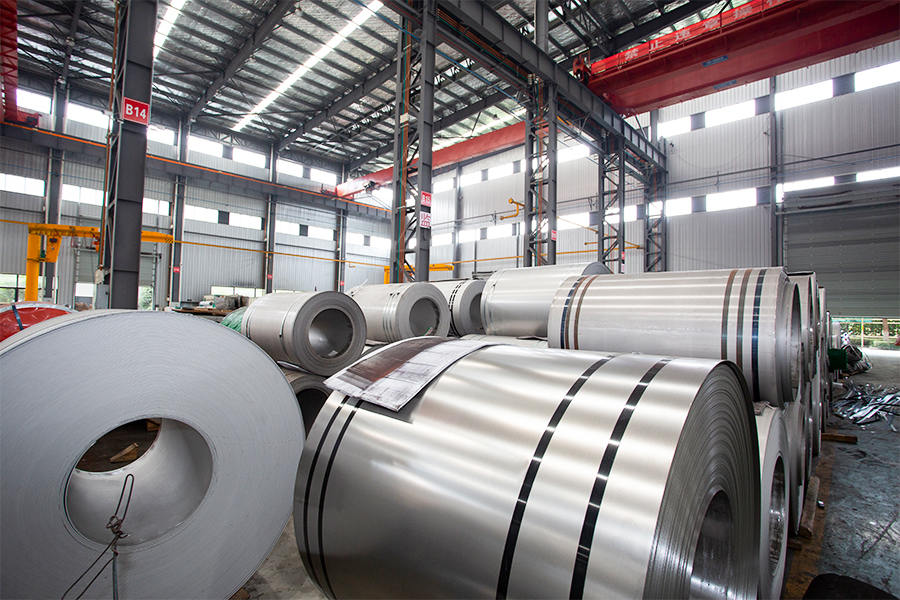Stainless Steel Coils as an important metal material, is widely used in many industrial fields. It not only has excellent corrosion resistance, high strength, good processing performance, but also provides a variety of surface treatments, specifications and stainless steel grades (such as 304, 316, 430, etc.) according to different application requirements.
1. Basic characteristics of stainless steel coils
Before we have a deeper understanding of the application, let's take a look at the core advantages of stainless steel coils:
Strong corrosion resistance: It can resist corrosion from a variety of acids, alkalis, and salts, and is suitable for chemical environments;
Excellent mechanical properties: High tensile strength, wear resistance, and impact resistance;
Flexible processing: It can be processed by cutting, welding, stamping, bending, stretching, etc.;
Various surfaces: Common surface treatments include 2B, BA, No.4, Mirror, etc., which meet decorative or technical requirements;
Recyclable and environmentally friendly: Green and sustainable materials with high recycling rate.

2. Building and Structural Engineering Field
1. Building Curtain Wall and Roof System
Stainless steel coils are widely used in building components such as exterior wall decorative panels, roof systems, rain gutters, curtain wall panels, etc. Its elegant metallic texture and excellent corrosion resistance make it an ideal choice for high-end buildings.
Surface treatments such as No.4 (brushed) and Mirror (mirror) are often used in exterior design;
Using 304 or 316 stainless steel can withstand corrosive environments such as rainwater and air pollution.
2. Bridges and Structural Components
Stainless steel coils also play an important role in bridge support components, bridge deck guardrails, protective covers, etc. Its weather resistance and structural strength advantages are becoming increasingly popular in long-life infrastructure projects.
3. Food and Pharmaceutical Industry
Stainless steel coils are particularly widely used in the food and pharmaceutical industries because these industries have extremely high requirements for cleanliness, pollution-free and corrosion resistance.
1. Food processing equipment
The food industry uses 304 or 316 grade stainless steel coils to manufacture:
Mixing tanks, conveyor belt surfaces;
Baking trays, refrigerator liners;
Workbenches and conveyor devices on food contact surfaces.
Its rust-proof and bacteria-free properties ensure food safety.
2. Pharmaceutical equipment and clean systems
316L stainless steel coils are widely used in:
Drug storage tanks, filter housings;
Clean room piping systems;
Medical device housings, laboratory cabinets.
Its good weldability and acid and alkali corrosion resistance make it an industry standard material.
4. Petrochemical and Energy Industry
Stainless steel materials used in the petrochemical industry must be able to withstand high temperature, high pressure, and highly corrosive environments. Stainless steel coils perform well in the following aspects:
1. Chemical reaction vessels
Used in the manufacture of storage tanks, reactors, heat exchanger housings, and piping systems, especially when dealing with acidic gases and corrosive liquids, high corrosion-resistant stainless steels such as 316/316L are the first choice.
2. Marine and energy engineering
In marine environments (such as offshore platforms and floating devices), stainless steel coils are used to make support structures, decorative panels, protective covers, etc., which can effectively resist seawater corrosion.
5. Automobiles and rail transit
With the popularization of lightweight and anti-corrosion concepts, stainless steel coils have occupied an increasingly important position in transportation equipment:
1. Body and chassis components
Used for automobile exhaust systems, body trims, fuel tanks, floor protectors, etc. 409, 439, and 304 stainless steel are common models, which are both resistant to high temperatures and can withstand chemical erosion.
2. Subway and high-speed rail shells
Stainless steel coils have become an ideal material for rail vehicle shells and interior panels due to their strong anti-deformation and anti-seismic properties.
6. Home appliances and kitchen equipment manufacturing
Stainless steel coils are one of the main materials for modern home appliances and kitchen supplies, combining practicality and aesthetics:
1. Household appliance shells
Widely used in the manufacture of refrigerators, microwave ovens, dishwashers, washing machines, etc., and the commonly used materials are BA (bright surface) or brushed surface.
2. Kitchen equipment
Including range hoods, stainless steel cabinets, sinks, faucets, ovens and other parts, with smooth surfaces, oil resistance, corrosion resistance and easy cleaning.
7. Power and electronics industry
1. Cable sheath and connection plate
Stainless steel coils are used to make cable jackets, electrical support parts and other parts in high-voltage transmission systems, cable protection, and substation equipment.
2. Precision electronic parts
Under the requirements of temperature resistance and electromagnetic interference resistance in the electronics field, stainless steel coils are also used to manufacture housings, electromagnetic shielding parts, precision structural parts, etc.
8. Decoration and furniture manufacturing
Stainless steel coils are widely used in:
High-end stainless steel cabinets, furniture panels;
Indoor decorative strips, wall panels, ceiling decorations;
Elevator interiors, handrails, stainless steel door frames.
Brushed, mirrored, and colored stainless steel coils provide diverse aesthetic options for buildings and homes.
9. Other special fields
1. Aerospace: used to manufacture corrosion-resistant cabin parts;
2. Military equipment: stainless steel has strong impact resistance and stability;
3. Environmental protection equipment: such as sewage treatment equipment and exhaust gas purification tower.
Conclusion: Multifunctional coils promote diversified industrial development
Stainless steel coils have become an indispensable basic material in many industrial fields due to their excellent comprehensive performance. From construction, food, energy, to transportation, home appliances, and electronics, their wide adaptability and sustainable development of technology and processes have made their position in future intelligent manufacturing and green engineering more and more solid.


 English
English русский
русский عربى
عربى 中文简体
中文简体
